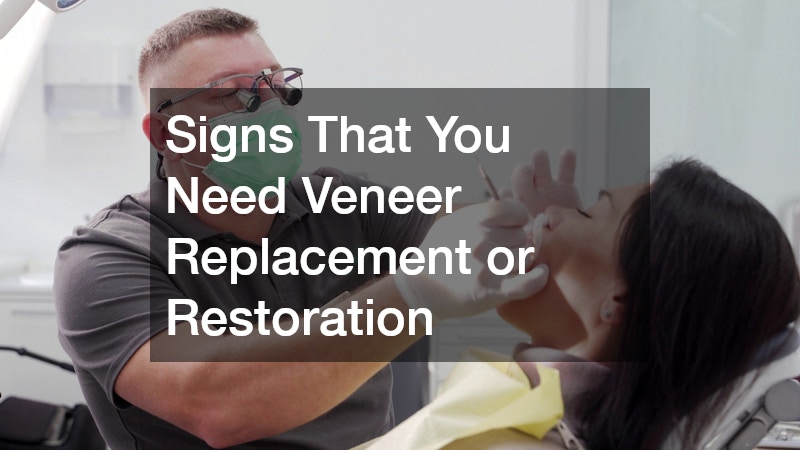Dental veneers have become one of the most sought-after cosmetic treatments for achieving a flawless, radiant smile. These thin, custom-made shells are designed to cover the front surface of teeth, enhancing their shape, color, and alignment. While veneers are known for their durability and long-lasting beauty, they are not indestructible. Over time, wear, damage, or changes in the mouth can affect their appearance and function.
Recognizing the signs that indicate the need for veneer replacement or restoration is essential for maintaining both oral health and aesthetics.
What Are the Common Signs That Veneers Need Replacement?
Changes in Color or Staining
One of the first and most noticeable signs that veneers may need replacement is discoloration or staining. Although porcelain veneers are highly resistant to stains, the bonding material that secures them to your teeth can discolor over time. In addition, lifestyle factors such as smoking, frequent coffee consumption, or certain medications can contribute to visible color changes. If your veneers no longer match the surrounding natural teeth or appear dull and yellowed, it may be time to consider professional restoration or replacement to restore a bright, uniform smile.
Chipping or Cracks
Just like natural teeth, veneers can chip, fracture, or crack due to physical trauma, excessive biting pressure, or long-term wear. Even a small chip can compromise both the look and integrity of the veneer. Chips and cracks not only affect your smile’s appearance but can also allow bacteria to seep beneath the veneer, leading to decay or gum irritation. Promptly addressing this type of damage helps prevent further complications and ensures that your veneers continue to function properly.
Misalignment or Loose Fit
Over time, the bond between a veneer and the natural tooth structure can weaken, causing the veneer to feel loose or slightly misaligned. Additionally, natural changes in your bite or shifts in tooth positioning can affect the fit. A veneer that no longer fits correctly can trap food particles, making it harder to maintain oral hygiene and increasing the risk of decay. If you notice that your veneer feels unstable, uneven, or uncomfortable when chewing, you should schedule an evaluation with your dentist to determine whether replacement is necessary.
Gum Recession Affecting Veneers
Gum recession is a common dental concern that can impact the appearance and effectiveness of veneers. As the gumline recedes, it may expose the margins of veneers, creating visible lines or gaps between the veneer and natural tooth. This can lead to an uneven smile and increase the potential for sensitivity or decay near the gumline. In such cases, veneer replacement or adjustment may be needed to maintain a seamless, natural appearance.
Noticeable Wear and Tear
Even high-quality veneers experience wear and tear over time due to daily activities such as eating, talking, and brushing. Clenching or grinding your teeth (bruxism) can also accelerate wear, leading to thinning or dulling of the veneer surface. If your veneers no longer reflect light as they once did or appear worn down, a replacement can help restore the youthful luster of your smile.
How Long Do Veneers Typically Last Before Needing Replacement?
Average Lifespan of Veneers
On average, veneers can last anywhere from 10 to 15 years, depending on the material used and the level of care they receive. Porcelain veneers generally last longer than composite resin veneers due to their superior strength and resistance to staining. However, even the most durable veneers will eventually require replacement as part of normal dental maintenance.
Factors Influencing Longevity
Several factors influence how long veneers last. These include the patient’s oral hygiene habits, dietary choices, bite alignment, and whether they grind or clench their teeth. Additionally, the skill of the dentist and the quality of the materials used play a critical role in determining veneer lifespan. Patients who avoid using their teeth to open packages, limit hard or sticky foods, and protect their veneers from unnecessary pressure tend to enjoy longer-lasting results.
Impact of Oral Hygiene Practices
Proper oral hygiene significantly extends the life of veneers. Daily brushing and flossing help prevent plaque buildup at the veneer’s edges, which could otherwise lead to gum inflammation or decay beneath the veneer. Non-abrasive toothpaste and a soft-bristled toothbrush are recommended to avoid scratching the veneer surface. Regular professional cleanings also help preserve their brilliance and ensure the underlying teeth remain healthy.
Frequency of Dental Check-Ups
Routine dental visits, ideally every six months, allow your dentist to monitor the condition of your veneers and identify early signs of wear, damage, or bonding issues. Early intervention can often correct small problems before they escalate into more significant concerns, potentially saving you from a full replacement.
Comparing the Longevity of Different Veneer Materials
The type of material used in your veneers affects both their appearance and longevity.
- Porcelain veneers are known for their durability and natural translucency, often lasting 15 years or more with proper care.
- Composite resin veneers, while more affordable, tend to have a shorter lifespan—typically 5 to 7 years—and are more prone to staining and chipping.
Your dentist can help you choose the right material based on your lifestyle, budget, and aesthetic goals.
What Are the Risks of Not Replacing Damaged Veneers?
Increased Risk of Tooth Decay
When veneers crack, loosen, or separate from the tooth surface, they can create small openings where bacteria can accumulate. This exposes the underlying tooth structure to decay, which can progress unnoticed until pain or sensitivity develops. Prompt veneer replacement helps prevent such decay and preserves your natural teeth.
Compromised Oral Health
Damaged or ill-fitting veneers can irritate the gums and surrounding tissues, leading to inflammation or infection. Poorly sealed veneers also make it difficult to clean properly, which can contribute to bad breath and other oral health problems. Maintaining intact veneers supports not just aesthetics but overall dental wellness.
Potential for Further Dental Complications
If damaged veneers are ignored, the issues can escalate into more complex dental problems. For instance, a loose veneer could break entirely or cause uneven pressure when biting, which may damage other teeth or dental work. Early restoration or replacement minimizes these risks and maintains proper bite alignment.
Aesthetic Impact on the Smile
Veneers play a central role in creating a bright, balanced smile. When they become discolored, worn, or chipped, the aesthetic harmony of your teeth is disrupted. Damaged veneers can make you feel self-conscious and less confident in social or professional settings. Replacing them promptly ensures that your smile remains attractive and natural-looking.
Cost Implications of Delayed Replacement
While replacing veneers requires an investment, delaying necessary dental care can lead to much higher costs down the line. Ignoring damaged veneers could result in tooth decay, root canal treatment, or even the need for crowns—procedures that are significantly more expensive than timely veneer restoration. Addressing problems early helps protect both your teeth and your wallet.
Conclusion
Veneers are a long-lasting and transformative dental solution, but they are not immune to time, wear, or damage. Regular monitoring and timely replacement or restoration ensure that your smile remains both healthy and beautiful. By staying alert to warning signs—such as discoloration, chips, misalignment, or gum recession—you can act before small issues become major concerns. Partnering with a skilled cosmetic dentist for regular check-ups and professional guidance will help you maintain your veneers and keep your smile radiant for many years to come.




